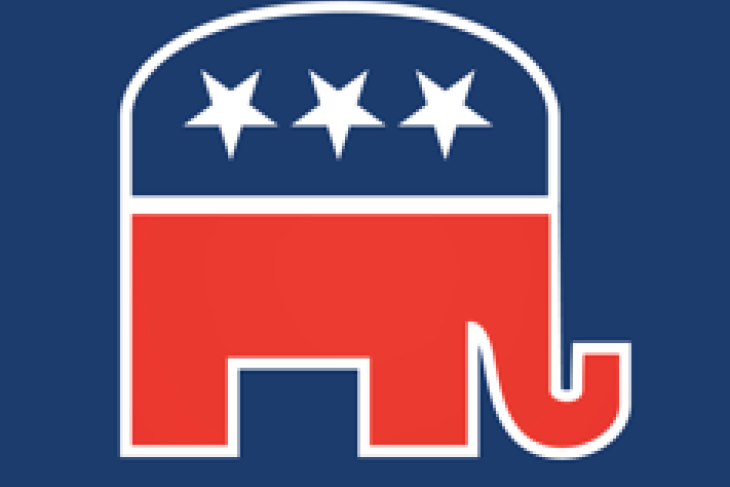At last, Judgment Day is upon us. Though it seems like only yesterday Fordham was hailing the results of the 2014 midterm elections, we’re now in the swing of a full-fledged presidential campaign. And tonight marks an important milestone on the road to the nuclear codes: the first primary debate. Since the Hillary Clinton steamroller seems poised to make inequality-decrying jelly out of her Democratic rivals, let's direct our attention to the Republican contenders and their thoughts on education.
We make our scene in fair Ohio, cradle of Republican presidents of old. Quicken Loans Arena will host ten men concentrating very hard on not using the phrase “self-deportation”:
- Former Florida Governor Jeb Bush
- Wisconsin Governor Paul Walker
- Florida Senator Marco Rubio
- Kentucky Senator Rand Paul
- Texas Senator Ted Cruz
- Former Arkansas Governor Mike Huckabee
- Retired neurosurgeon Ben Carson
- Ohio Governor John Kasich
- New Jersey Governor Chris Christie
- Renowned author, entrepreneur, and humanitarian Donald Trump
The arena, home to the Cleveland Cavaliers and therefore the site of much uproarious futility, will sadly not host a repeat self-immolation by former Texas Governor Rick Perry. That’s because tonight’s ten hopefuls have been culled from a field of eighty-six seventeen (through a process of polling averages whose arcane purposes are known only to Roger Ailes), and the unlucky leftovers have been exiled to an earlier timeslot. After a furious round of media speculation, Perry’s been shunted aside in favor of late-entry Kasich, and the field is set.
In the two hours of no-holds-barred palaver, we’ll keep our ears open for mentions of ESEA reauthorization, school choice, and voucher systems. But the real action on education will surely center on two specific issues: Higher education and Common Core. All of these candidates have aired their thoughts on one or both, and none are likely to debut any new policy positions onstage. Here’s our recap of their recent stances.
Higher education
Professors, hang onto your laurels: The costs associated with attending college, and indeed the very structure and institutions of our national system of higher education, will be a major focus of debate for the next year. With tuition rising at schools across the country, affordability figures to be a discussion point tonight. Chris Christie has already broached the topic, and Marco Rubio has issued proposals that would drastically alter the delivery and finance of higher education in America.
At a speech in Iowa earlier this summer, Christie detailed a diverse menu of policies for containing college costs. He first dismissed the burgeoning Democratic vision of “debt-free college” as a “typical liberal approach,” adding that “it seems fair for [students] to support the cost of the education they’re receiving.” Instead, he called on Congress to expand financial aid programs and raised the possibility of income-share agreements, by which students could borrow from certified investment groups and then repay the sum over the length of their careers.
Christie is joined in his enthusiasm for private lending by Marco Rubio, who has dubbed his concept “Student Investment Plans.” Unveiling the proposal last year, he said, "Unlike with loans, you would be under no legal obligation to pay back the entire [cost of tuition]. Your only obligation would be to pay…4 percent of your income per year for ten years.” More recently, he’s lambasted the present postsecondary landscape as a “cartel of existing colleges and universities, which use their power over the accreditation process to block innovative, low-cost competitors from entering the market” and vowed to revamp the status quo.
Other candidates have offered some form of public comment, though usually in a more opaque fashion. Mike Huckabee has inveighed against the “mountains of debt” incurred by many students. Scott Walker has drawn national attention for slashing state aid to the University of Wisconsin system and attempting to strip tenure from academics. Heck, Donald Trump ran a university for a time. We’ll look for more specifics tonight.
Common Core
Common Core is the other big education issue moderators are likely to ask about. The standards have been a lightning rod for would-be GOP candidates, in part because most have expressed fierce disapproval—but also because at least two debate participants, Jeb Bush and John Kasich, seem to support them.
“In my view, the rigor of the Common Core State Standards must be the new minimum in classrooms,” said Bush back in November—though he qualified that this week by adding that “the federal government should have no role in the creation of standards.” And last month, Kasich somewhat nebulously pledged, “I’m going to make sure, at least in my state, that standards are high and local control is maintained….Now, some may call that Common Core. I don’t really know.”
So the two lone supporters in the group are treading lightly. They approve of what the Common Core is supposed to be—state-led, locally implemented, rigorous standards that create a new and improved minimum in schools—but they vow to divest the federal government of all involvement. And this laborious tiptoeing isn’t surprising given the straightforward and sometimes vicious opposition from the rest of the field.
“End Common Core. Common Core is a disaster,” declared frontrunner Donald Trump back in June. Ted Cruz hopes to “repeal every word.” Rand Paul wants to “abolish” it. And Marco Rubio believes the standards “will eventually be used to force on states policies the federal government wants.” Scott Walker, Ben Carson, Chris Christie, and Mike Huckabee also actively oppose them—although Huckabee’s done a 180 over the last two years, stating as recently as June 2013 that “[t]hese standards, known as Common Core State Standards, have been near and dear to my heart since I served as governor of Arkansas.”
***
Aside from those two issues, there’s little other disagreement between the ten potential nominees when it comes to education. Most support school choice and deride the Department of Education. (In fact, at least five have called for the complete abolishment of the agency.) Although choice and the federal role in education are policy stances that voters should definitely take into account during the primaries, they aren’t particularly interesting fodder in a GOP-only debate.
In any case, be sure to tune in to Fox News at 9:00 pm. The clash should be interesting.





